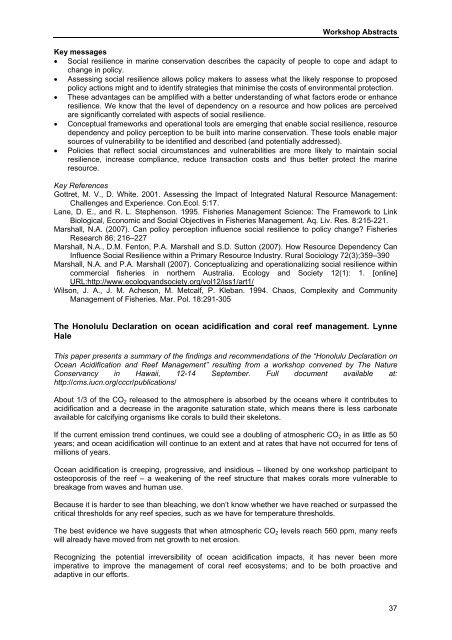Obura2009-IUCN Congress report - Resilience sessions
Obura2009-IUCN Congress report - Resilience sessions.pdf
Obura2009-IUCN Congress report - Resilience sessions.pdf
You also want an ePaper? Increase the reach of your titles
YUMPU automatically turns print PDFs into web optimized ePapers that Google loves.
Workshop Abstracts<br />
Key messages<br />
• Social resilience in marine conservation describes the capacity of people to cope and adapt to<br />
change in policy.<br />
• Assessing social resilience allows policy makers to assess what the likely response to proposed<br />
policy actions might and to identify strategies that minimise the costs of environmental protection.<br />
• These advantages can be amplified with a better understanding of what factors erode or enhance<br />
resilience. We know that the level of dependency on a resource and how polices are perceived<br />
are significantly correlated with aspects of social resilience.<br />
• Conceptual frameworks and operational tools are emerging that enable social resilience, resource<br />
dependency and policy perception to be built into marine conservation. These tools enable major<br />
sources of vulnerability to be identified and described (and potentially addressed).<br />
• Policies that reflect social circumstances and vulnerabilities are more likely to maintain social<br />
resilience, increase compliance, reduce transaction costs and thus better protect the marine<br />
resource.<br />
Key References<br />
Gottret, M. V., D. White. 2001. Assessing the Impact of Integrated Natural Resource Management:<br />
Challenges and Experience. Con.Ecol. 5:17.<br />
Lane, D. E., and R. L. Stephenson. 1995. Fisheries Management Science: The Framework to Link<br />
Biological, Economic and Social Objectives in Fisheries Management. Aq. Liv. Res. 8:215-221.<br />
Marshall, N.A. (2007). Can policy perception influence social resilience to policy change? Fisheries<br />
Research 86; 216–227<br />
Marshall, N.A., D.M. Fenton, P.A. Marshall and S.D. Sutton (2007). How Resource Dependency Can<br />
Influence Social <strong>Resilience</strong> within a Primary Resource Industry. Rural Sociology 72(3);359–390<br />
Marshall, N.A. and P.A. Marshall (2007). Conceptualizing and operationalizing social resilience within<br />
commercial fisheries in northern Australia. Ecology and Society 12(1): 1. [online]<br />
URL:http://www.ecologyandsociety.org/vol12/iss1/art1/<br />
Wilson, J. A., J. M. Acheson, M. Metcalf, P. Kleban. 1994. Chaos, Complexity and Community<br />
Management of Fisheries. Mar. Pol. 18:291-305<br />
The Honolulu Declaration on ocean acidification and coral reef management. Lynne<br />
Hale<br />
This paper presents a summary of the findings and recommendations of the “Honolulu Declaration on<br />
Ocean Acidification and Reef Management” resulting from a workshop convened by The Nature<br />
Conservancy in Hawaii, 12-14 September. Full document available at:<br />
http://cms.iucn.org/cccr/publications/<br />
About 1/3 of the CO 2 released to the atmosphere is absorbed by the oceans where it contributes to<br />
acidification and a decrease in the aragonite saturation state, which means there is less carbonate<br />
available for calcifying organisms like corals to build their skeletons.<br />
If the current emission trend continues, we could see a doubling of atmospheric CO 2 in as little as 50<br />
years; and ocean acidification will continue to an extent and at rates that have not occurred for tens of<br />
millions of years.<br />
Ocean acidification is creeping, progressive, and insidious – likened by one workshop participant to<br />
osteoporosis of the reef – a weakening of the reef structure that makes corals more vulnerable to<br />
breakage from waves and human use.<br />
Because it is harder to see than bleaching, we don’t know whether we have reached or surpassed the<br />
critical thresholds for any reef species, such as we have for temperature thresholds.<br />
The best evidence we have suggests that when atmospheric CO 2 levels reach 560 ppm, many reefs<br />
will already have moved from net growth to net erosion.<br />
Recognizing the potential irreversibility of ocean acidification impacts, it has never been more<br />
imperative to improve the management of coral reef ecosystems; and to be both proactive and<br />
adaptive in our efforts.<br />
37


















